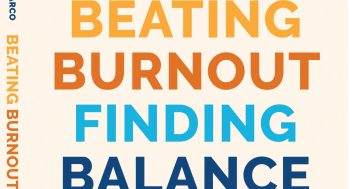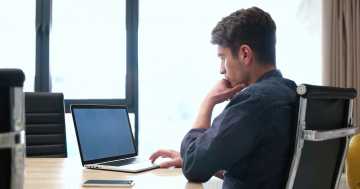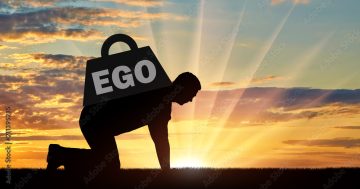Kara Schlegl* shares some handy advice for introverts who have been violently wrenched out of their cosy pandemic bubble and forced back into the world.
 I’m going to be honest up top and say I’m not a huge fan of the word “introvert”. Not because it isn’t a real thing.
I’m going to be honest up top and say I’m not a huge fan of the word “introvert”. Not because it isn’t a real thing.
The words introvert and extrovert have been used for a century to describe a person’s “social battery”, or our capacity to socialise before experiencing social burnout.
If you spent lockdown scratching at the walls and trying to make small talk with a passing ant, it’s likely you’re more extroverted.
But if you were content sitting alone in your musty apartment watching every episode of Criminal Minds, and are still doing exactly that, even though lockdown ended, then you’re probably more introverted.
But these conditions are often misunderstood by Instagram affirmations and online quizzes as a fun personality trait, when they can be somewhat debilitating in their extremes.
A study out of the University of Glasgow reported this year that extroverts will likely suffer a substantial and long-lasting mental health toll due to extended lockdowns, and many studies have shown that introverts report higher rates of depression and decreased mental wellbeing.
With this in mind, I would say I’m a fairly extreme introvert.
My social battery has the capacity of those off-brand robotic bunnies that die out immediately in Duracell ads.
And now that lockdown has ended, I’m trying my best to recall how the heck I used to cope with my tendency to fall flat on my back and kick my legs in the air mid-dinner with friends (figuratively speaking, of course, unless I’ve had a few drinks).
I’m certainly no expert, but I’m well practised with social burnout, and I’ve had a lot of alone time to do my research.
So, here’s some handy advice for my fellow introverts who are being violently wrenched out of their cosy pandemic bubble and forced into the world.
Know your limits
It might sound a bit self-involved, but I think the first thing any introvert should do before stepping foot outside is to think about themselves.
For some, after lockdown, expectations for social engagements are at an all-time high.
Instagram is once again filled with extroverts looking like when you unleash your dog at the park and they start humping everything.
There’s a lot of pent-up social energy being expressed right now, and by “expressed” I mean that I saw two couples making out on the train to work the other day — it was 7am.
You might be asking yourself, “Should I be making out with somebody in a public place at 7am?”
To that I say, you should only do what you feel comfortable doing (as long as it’s legal, of course).
Tell your mates
After a lifetime of not showing up to things, one of my greatest fears is that my friends will stop inviting me out.
This would be reasonable behaviour on their part, of course.
But I learned long ago that if I’m honest with them about my general desire to hide in the hollow of a tree every Friday night, they’re generally very understanding (and if they aren’t, they might not be the right fit for you).
The hard truth is that you can’t expect people to meet your needs if you don’t tell them what those needs are.
This is especially true when it comes to a partner. Get you someone who will leave you alone for 24-48 hours when politely asked.
Meditate (or something like it)
If you look up ‘how to cope with social burnout’, the first piece of advice most listicles will offer is to “meditate”.
I personally have the attention span of a 4-year-old at Disney World, so classic meditation isn’t a go for me.
However, I find listening to true crime podcasts that detail brutal murders committed by violent serial killers helps me calm down and centre myself.
I recommend finding your own form of meditation, even if it’s a bit messed up, and use it as a self-soothing tool after a big night out.
Schedule some hardcore alone time
Sometimes socialising isn’t a choice, like if you have a very chatty co-worker, or if there’s a family event that you have to attend or else suffer a stream of passive aggressive texts from your mother-in-law.
It’s important then to respect your own needs by ensuring there’s time for you to recharge in between exhausting conversations about the latest episode of Succession.
Dedicate a good chunk of time every week to reading a book, tending to your garden, or lying face down on your bed and only rolling over once you’ve developed at least one bed sore.
Ask for help
There is a difference between “healthy alone time” and “collecting clipped toenails in jars” alone time.
As I mentioned earlier, introversion can sometimes lead to poor mental health outcomes, and social burnout is a significant symptom of other mental health conditions, such as ADHD and autism.
I thought for a very long time that my tendency to hide in my room for three days after any social interaction was just classic introvert behaviour, but romanticising myself as a Jane Austen heroine didn’t prevent my extreme social burnout from impacting my 21st century life.
Talking about the struggle with friends and family, and getting a therapist, has made all the difference.
This is the one piece of advice that changed the game for me — just because you experience social burnout, it doesn’t mean you don’t deserve a happy and healthy social life.
* Kara Schlegl is a writer, producer and story-teller from Sydney, Australia.
This article first appeared at abc.net.au











